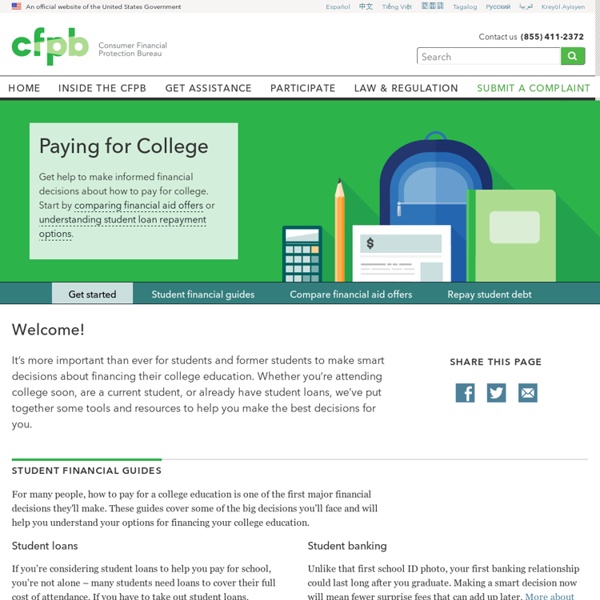



Choose a student loan Federal Loan Options Federal student loans almost always cost less and are easier to repay than private loans. You must complete the Free Application for Federal Student Aid (FAFSA) to be eligible for federal student loans. Perkins Loans Subsidized with a fixed 5% interest rate, administered through your school, and awarded based on financial need If you are eligible, you should take this loan first Direct Loans Either subsidized or unsubsidized Everyone is eligible for the Unsubsidized Direct Loan, and Subsidized Direct Loans are awarded based on financial need Parent or Grad PLUS Loans Available to graduate students and parents Parents with PLUS loans are responsible for repaying those loans Private Loan Options There are many different private loan options, with different interest rates and costs. Borrowing beyond your federal loans could mean high levels of debt. However if you need a private student loan, you should know that there are some unexpected places to look for deals. School Loans
4 Overlooked Ways to Pay for College Paying for college is rarely easy. Ideally, it's a longterm process of building and using a collection of savings, institutional aid, free money, and—if necessary—loans. [Discover more ways to accumulate money at the College Savings Center.] But with so many avenues for financing your education, it's often difficult to sort out what might work best for you, given your situation and time frame. Exhaust your federal options: Because federal loans (Stafford and Perkins) are cheaper and have more flexible repayment options, students with financial need should always exhaust their federal options before looking to private loans, says Kevin Walker, cofounder and CEO of SimpleTuition.com. "Some families might believe, 'We're upper middle class; our income is upper level so we wouldn't qualify,'" Walker notes. [Learn more about the benefits of federal student loans.] Consider 529 plans: If you have some time before college, a 529 savings plan may be an attractive route for you.
Avoiding Scams Before you apply for financial aid, learn how to spot potential fraud, avoid paying for free services, and prevent identity theft. Save Your Money: Don’t Pay for Help to Find Money for CollegeTry These Free Sources of InformationDon’t Pay for the FAFSA® Save Your Identity: How Does Identity Theft Happen?Reduce Your Risk When Applying for AidHow We Keep Your Information Safe Report Fraud and Identity Theft: Report Financial Aid FraudReport Fraudulent Activity by a CollegeReport Identity Theft Save Your Money Don’t Pay for Help to Find Money for College Commercial financial aid advice services can cost well over $1,000. If you're unsure whether to pay a company for help finding financial aid, stop and think for a minute: What's being offered? "Buy now or miss this opportunity." Top Try These Free Sources of Information Types of Federal Student Aidother federal agenciesa college or career school financial aid officea high school or TRIO counselor your state grant agency the U.S. Save Your Identity
State & Regional Associations NASFAA works in partnership with six regional associations of financial aid administrators to deliver excellence in student aid administration. These regional associations in turn work closely with state associations representing all 50 states, the District of Columbia, Puerto Rico, the U.S. Virgin Islands and the Pacific Islands. While we work at the national level, state and regional associations play an important role in advocating for and serving students in their communities. We support local associations through activities such as: Background NASFAA was created as an outgrowth of regional associations of financial aid administrators and maintains a healthy working relationship with the regions to this day. While NASFAA and the six regional associations share many commonalities, they are independent non-profit organizations with their own governance.